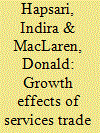| Srl | Item |
| 1 |
ID:
105898


|
|
|
|
|
| Publication |
2011.
|
| Summary/Abstract |
The European Union (EU) is the largest importer and exporter of services and plays a dominant role in the global services economy. Although such key economic indicators suggest the EU's services market is open to both EU and non-EU service providers alike, a number of administrative, legal and regulatory barriers remain in place-potentially restricting cross-border trade in services, in particular in the professional services sector. In order to overcome these potential trade barriers, the EU has adopted a number of legislative measures to improve the operation of its internal services market. The EU Services Directive and the Directive on the Recognition of Professional Qualifications aim to make the EU a more open and efficient marketplace for EU service providers, notably for professional services providers. The EU's long-lasting process in providing market access and the recognition of professional qualifications for EU professionals underscores the difficulties of creating a well-integrated economy by progressively reducing the member states' competences and prerogatives. This process also emphasises the challenges faced by non-EU service providers attempting to provide professional services across EU member states. This article critically examines the effectiveness of the EU as a market for professional services for both EU and non-EU professionals, and argues that there is still much work to be done in the implementation of these directives before the EU achieves its aim as a leader in the global market for professional services.
|
|
|
|
|
|
|
|
|
|
|
|
|
|
|
|
| 2 |
ID:
076925


|
|
|
|
|
| Publication |
2007.
|
| Summary/Abstract |
The World Trade Organization (WTO) General Agreement on Trade in Services (GATS) and its Annex on Financial Services provide the international legal framework for the regulation of cross-border trade in financial services. This paper analyses the main provisions of the GATS that relate to regulatory transparency of trade in financial services. The GATS generally provides a flexible framework for states to negotiate liberalisation commitments while providing WTO members with autonomy to promote their regulatory objectives. The extent to which states, however, must adhere to GATS disciplines regarding transparent regulatory practices has become a source of policy debate. Although the WTO has played no role in setting financial regulatory standards, the transparency obligations of the GATS have important implications for how financial regulators can achieve their objectives. Moreover, GATS transparency obligations can potentially create disproportionate administrative costs for developing countries and thus undermine their financial sector development. The paper argues that the principles of regulatory transparency in the GATS should be interpreted in a way that favours regulatory discretion to achieve financial stability and other prudential objectives. In the post-Doha era, WTO members should attempt to clarify GATS transparency obligations in a way that promotes financial development and regulatory autonomy
|
|
|
|
|
|
|
|
|
|
|
|
|
|
|
|
| 3 |
ID:
076926


|
|
|
|
|
| Publication |
2007.
|
| Summary/Abstract |
The General Agreement on Trade in Services (GATS) has attracted much attention in public and academic debate. The aim of this article is to analyse the application of the GATS to internet-based services, thus providing a lens through which important issues concerning the GATS can be highlighted. This article reviews the far-reaching implications of the recent US - Gambling dispute for the regulation of (internet-based) services. It argues that World Trade Organization Members need to make a greater effort to delineate the key GATS obligations (market access, national treatment, and disciplines on domestic regulation) in order to provide national law- and policy-makers and trade negotiators with more legal certainty and predictability in the application of the GATS
|
|
|
|
|
|
|
|
|
|
|
|
|
|
|
|
| 4 |
ID:
055898


|
|
|
| 5 |
ID:
076924


|
|
|
|
|
| Publication |
2007.
|
| Summary/Abstract |
The article examines the World Trade Organization (WTO) Appellate Body's ruling in US - Gambling that United States (US) prohibitions on the foreign supply of gambling and betting services via the internet to consumers in the US violated US market access commitments under Article XVI of the General Agreement on Trade in Services (GATS). The article reviews the main arguments criticising the decision and suggests that these views are (i) misguided because they rely excessively on a textual approach to interpreting Article XVI market access commitments, and (ii) lead to results that do not conform with the common intentions of the negotiating parties. The article argues for an approach that relies primarily on examining the facts of each case and the context in which WTO Members' commitments are negotiated. This approach also emphasises the importance of WTO Members making clear and precise market access commitments. In the author's view, the Appellate Body ruling adds more clarity to how GATS market access commitments will be interpreted in the future and, in doing so, facilitates market access negotiations and the making of additional commitments by WTO Members
|
|
|
|
|
|
|
|
|
|
|
|
|
|
|
|
| 6 |
ID:
054902


|
|
|
| 7 |
ID:
116151


|
|
|
| 8 |
ID:
114004


|
|
|